Blood on the Glass Ceiling: Ambitious Women in Literature
Stephanie Feldman Recommends Novels That Find Joy in Triumph and Destruction
As I wrote my new novel, Saturnalia, I had a million post-2016 concerns on my mind, including anxiety about the future, climate catastrophe, and our ongoing reckoning with gender and power—all heavy themes for a thriller about secret societies, monsters, and alchemy. It took a reader’s eye to identify the core theme: women’s ambition. Saturnalia follows a woman protagonist with a strong case of imposter syndrome, navigating elite institutions in a world where success is tantamount to survival.
Maybe it makes sense that I was blind to this fundamental force. It’s ever-present. I’ve been driven to succeed since I was kid and have judged myself according to whatever common metrics pinched me in a vise: good grades, admission to elite schools, publication and recognition. At the same time, I’ve held myself back.
In the workplace, I confused success with being well-liked—undemanding, eager to work more for less. In publishing, I was afraid to take risks, fearful that I wasn’t good enough, cool enough, or well-connected enough to survive the leaps of faith. In my personal life, I’ve accepted that ambition means “having it all”—or, rather, doing everything, refusing help and putting responsibility to others over responsibility to myself. In other words, I’m a woman with kids, a pretty heteronormative lifestyle, and an unpredictable income.
Maybe the only place I’ve been truly ambitious is in my writing life. I’ve remained faithful to my vision and relentless in my commitment to it. I write and submit and write more, even when doors slam in my face and windows refuse to budge. I haven’t bent to the market or expectations, even when it might have benefitted my career.
In a way, it’s the same kind of ambition that Saturnalia’s protagonist, Nina, needs to learn. She starts out as a stunted social climber; she ends up discovering power beyond networks, status, and even money. Nina also takes revenge, spills some blood, and unleashes chaos. As a writer and reader, I find joy in destruction as well as triumph. If you’re a woman, you can’t win without breaking the rules.
Here are seven books featuring driven women characters in a society that doesn’t want them to succeed. These women show that ambition is messy, sometimes tragic, but still essential, and their journeys fuel books that are as nuanced as they are exhilarating.
*
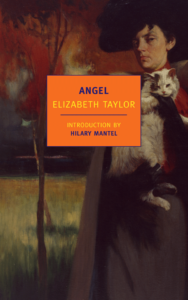
Elizabeth Taylor, Angel
Elizabeth Taylor may be a “writer’s writer,” but the eponymous protagonist of her 1957 novel is a true writer’s antihero. We first meet Angel when she’s a teenaged girl, bored by books—they aren’t about her!—but devoted to writing her own romance and publishing it as is, purple prose and historical inaccuracies and all. Angel becomes a wildly popular and critically detested author and grows bitter in her lifelong attempts to be seen as talented. In her introduction to a recent edition, Hilary Mantel says that Angel, like all writers, is a “monster” with a “cast-iron vanity.” Maybe Angel is a parody, a warning, or device, but I loved reading about a woman—however deluded and miserable—who doesn’t once doubt herself.
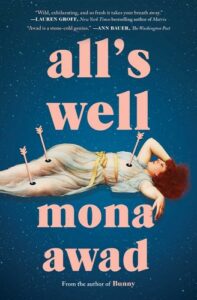
Mona Awad, All’s Well
Unlike Angel, Miranda Fitch, the protagonist of All’s Well, is a failed artist. An actress whose career was ended by a (literal) fall from the stage, Miranda now struggles with chronic pain, a precarious position in a college theater department, and an ungrateful student cast. When three mysterious benefactors give Miranda both financial sponsorship and a miraculous painkilling cocktail, she can finally claim what she wants—a new man, beauty and grace, academic success, and a second chance at inhabiting the heroine Helen, who maybe wants all the wrong things. It’s a thrill to watch an increasingly delirious Miranda claim her desires, even when we know the play has to end sometime.
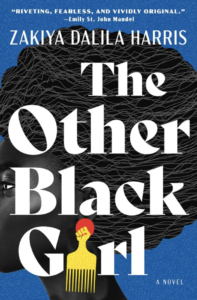
Zakiya Dalila Harris, The Other Black Girl
The Other Black Girl is another novel with a spiraling, unreliable narrator. Instead of negotiating academia and the stage, Nella is on the bottom rung of corporate publishing, and the only Black woman in the office. When a new Black editorial assistant arrives, solidarity quickly turns to competition. This novel turns class and racial politics, and the mental and social trap of being “the only one,” into a thriller. In white corporate America, can you succeed without selling your soul—or destroying someone else’s? The genre twists may be heightened, but the pain and danger are absolutely authentic.
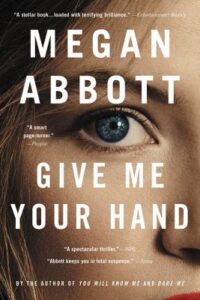
Megan Abbott, Give Me Your Hand
Here’s a second thriller about competition and unspoken quotas, this time about life-long friends. As young girls, Diane and Kit awakened each other’s confidence and scientific ambition; now, as adults, they find themselves competing for the same coveted laboratory position. Give Me Your Hand explores how easily Diane and Kit’s passionate friendship tips into vicious rivalry, with the added pressures of a male-dominated milieu. Like all ambitious women, the novel is haunted by questions about women’s intelligence and stability, as embodied by the research topic of Premenstrual Dysphoric Disorder.
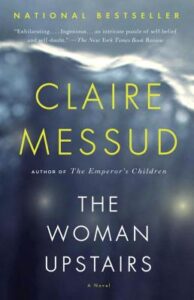
Claire Messud, The Woman Upstairs
This novel’s 2013 publication set off another round in the “unlikable woman character” debate, or, rather, wave in the swamp. Claire Messud famously responded to the discourse by saying, “If you’re reading to find friends, you’re in deep trouble… The relevant question isn’t ‘is this a potential friend for me?’ but ‘is this character alive?’” The Woman Upstairs’ protagonist Nora is very much alive, and likely familiar: a woman approaching middle-age, who has given up on her dreams and settled for a life on the periphery. Or, rather, she hasn’t given up and she can’t settle—especially when she meets a loving, successful family that seems to have everything she desires. What is most exhilarating about this novel is Nora’s raw honesty about the other side of ambition—the anger and bitterness that chase her dreams of achievement.
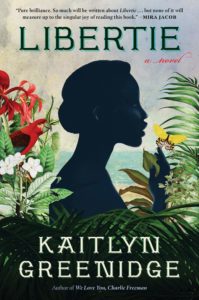
Kaitlyn Greenidge, Libertie
Libertie forgoes horror to take a historical, reflective approach to the question of ambition, through the coming-of-age tale of a young Black woman in Reconstruction-Era New York City and then Haiti. Libertie’s mother is professionally and socially ambitious: she’s one of the first Black women doctors in the country, dedicated to serving her community and starting a hospital. But she also imposes her ambition on her daughter, who has no interest in becoming a doctor. Instead, Libertie has to discover her own ambition—which, through another lens, is her own experience of the freedom promised her. Her greatest goal is to find equality, in society and in her own marriage; to be her own self, and to be loved for it.
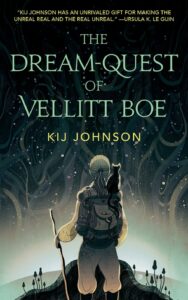
Kij Johnson, The Dream-Quest of Vellitt Boe
Finally, a fantasy novella that isn’t a horror show about the dangers or impossibility of women’s ambition, but a model of what a woman’s path can be. Vellitt Boe is 55-year-old math professor at Ulthar Women’s College in the Dreamlands (or, rather, a reimagined version of HP Lovecraft’s Dreamlands), who must pack up her pet cat and go on an adventure-quest to find her top student, who has left to embark on a potentially world-destroying marriage. If Vellitt Boe faces similar barriers in her hallucinatory Dreamlands as the protagonists in the real world, she is also a familiar person and an unfamiliar heroine—a midlife, capable pro who is as formidably able as any young male adventurer. She’s the oldest woman character in this list, and the least diminished.
________________________________
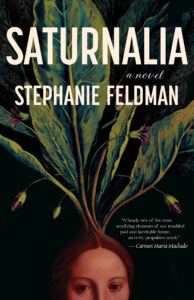
Saturnalia by Stephanie Feldman is available now via Unnamed Press.




















